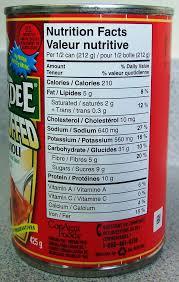Obviously, we need food labels. We need to know what the product is in that multicolored can or box, and having the information on the nutritional content of the product can be helpful when used appropriately. But some terms are less clear, and in some cases undefined and/ misleading. For example, ‘All natural’ has no FDA-approved definition, and ‘fresh’ might not be true if an item doesn’t sell quickly. All such labels can generally be termed ‘informational,’ and it’s up to the consumer to interpret them concerning their own needs.
There’s another kind of label on consumer products — the warning label — that we’re all familiar with on cigarette packages and alcohol-containing beverages concerning pregnant women. Some would like to see such labels on foods because of their content of ingredients popularly considered ‘bad.’ Sugar in beverages is a case in point.
Luckily for our general sanity, however, one can’t just slap a warning label on foods whenever an ingredient is frowned upon. Dr. Richard Kahn from the University of North Carolina, Chapel Hill explains cogently in the Annals of Internal Medicine, how one such effort has (and should) come to naught.
Using the aforementioned examples of tobacco and alcohol warning labels, Dr. Kahn notes one might infer that government can mandate such a label if it finds that a product confers a health risk. However, a recent case in which San Francisco passed an ordinance requiring a warning label on advertisements for sugar-sweetened beverages (SSB): “Warning: Drinking beverages with added sugar(s) contributes to obesity, diabetes, and tooth decay” shows the problem with this concept.
Although the U.S. District Court upheld the ordinance, the U.S. Court of Appeals ruled in favor of the plaintiffs, overturning the District Court’s ruling.
The key to the Appeals Court ruling was that the warning message didn’t specify that over-consumption might be problematic. Further, explains Kahn, it
also cited statements from the U.S. Food and Drug Administration that sugars are “generally recognized as safe . . . and can be part of a healthy dietary pattern when not consumed in excess amounts” and that “added sugars . . . are no more likely to cause weight gain in adults than any other source of energy”
Thus, the court recognized that there must be clear, scientifically validated evidence that a food or ingredient is likely to have negative health effects.
As Dr. Kahn put it:
[T]he wording of any health warning is critical; it must reflect the totality of the scientific evidence and cannot be misleading. When the body of evidence is both incomplete and full of conflicting studies, considerable controversy exists. In these circumstances, it is premature for government to require a warning label for SSBs.
Thus a vague warning about a demonized ingredient 1) has been ruled against, and no such label will be allowed. It’s always possible that some new iteration of that misleading warning will be attempted — let’s hope that any such will be summarily dismissed.
1) Sugar seems to be in the spotlight of some activists to an extent not seen with other ingredients. Even when fat was almost universally maligned, I do not recall anyone trying to slap a warning label on butter-rich croissants or other pastries. It may well be the case that SSBs, since their only energy-containing ingredient is sugar, are simply the poster children that activists can focus on easily.




